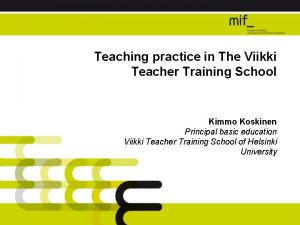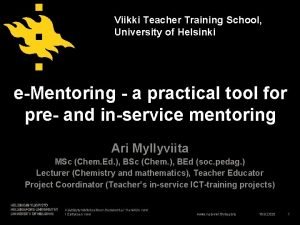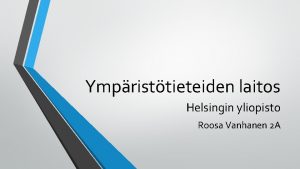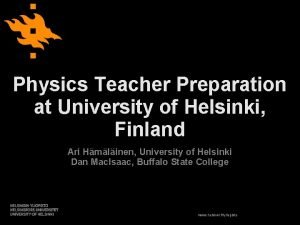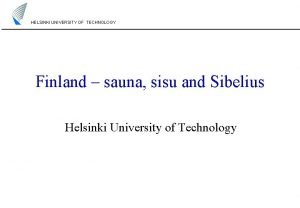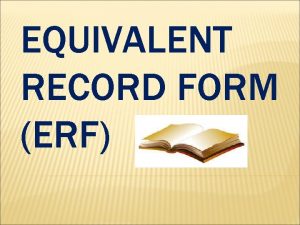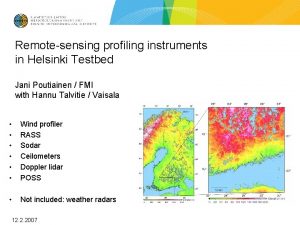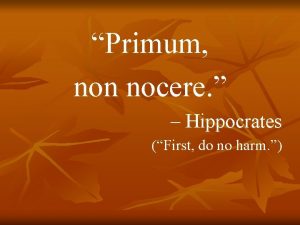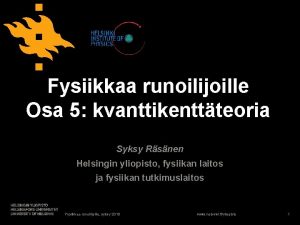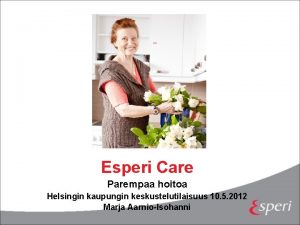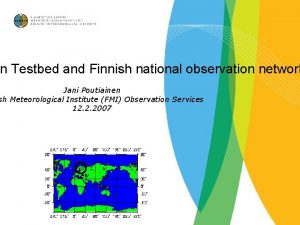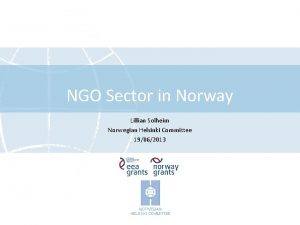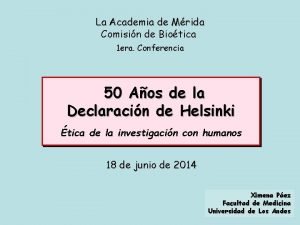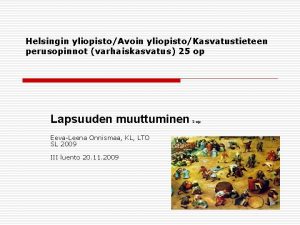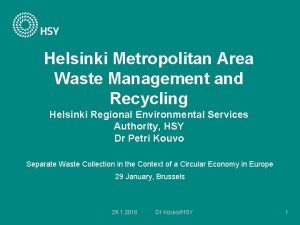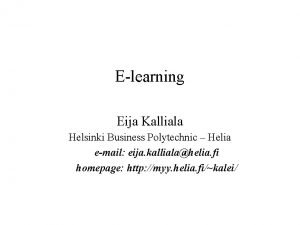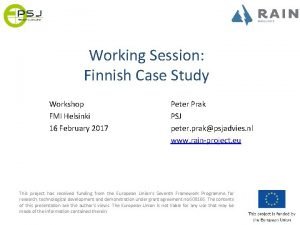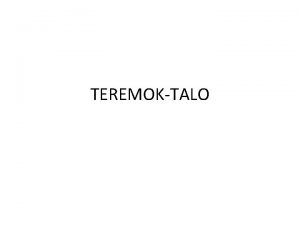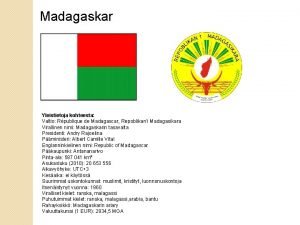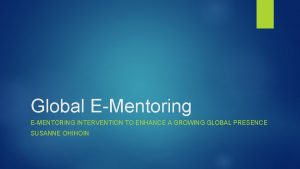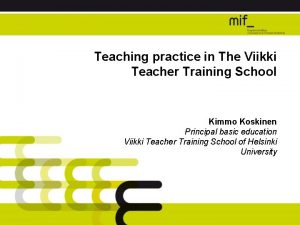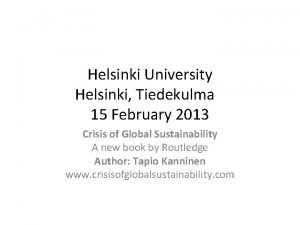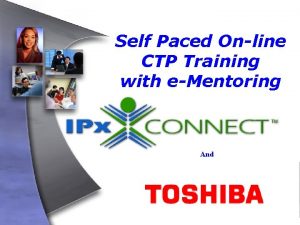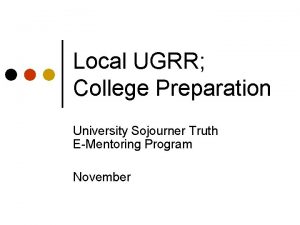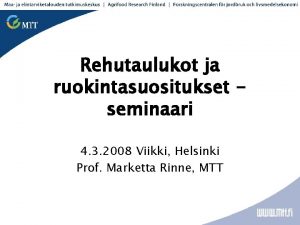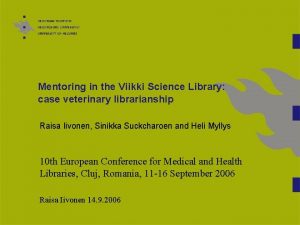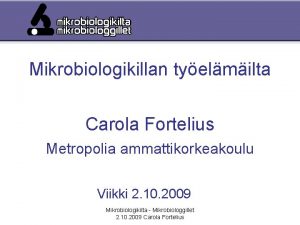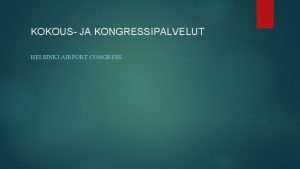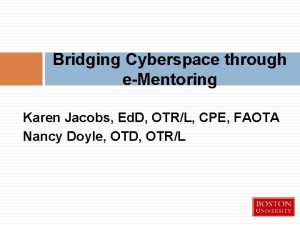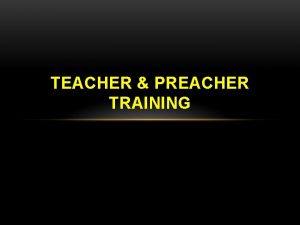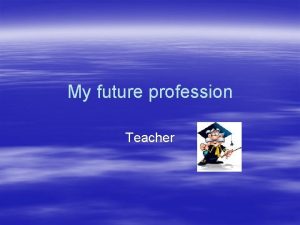Viikki Teacher Training School University of Helsinki eMentoring


























- Slides: 26

Viikki Teacher Training School, University of Helsinki e-Mentoring - a practical tool for pre- and in-service mentoring Ari Myllyviita MSc (Chem. Ed. ), BSc (Chem. ), BEd (soc. pedag. ) Lecturer (Chemistry and mathematics), Teacher Educator Project Coordinator (Teacher’s in-service ICT-training projects) Käyttäytymistieteellinen tiedekunta / Henkilön nimi / Esityksen nimi www. helsinki. fi/yliopisto 16. 9. 2020 1

Finnish Teacher Training Schools, www. ftts. fi • Finnish teacher education has a strong connection to Finnish Teacher Training Schools. • A crucial part of it is the creation of pedagogical knowledge and the practical training in training school. • During the school practice student teachers has their own supervising teachers, mentor teachers. • During the teaching practice the relationship between student teacher and mentor teacher is relevant. • During teaching practice student teachers are forced to learn how to use ICT and social media in teaching and communication in the school environment. • e-Mentoring is new approach how to support student teachers after they have finalized their studies. Käyttäytymistieteellinen tiedekunta / Henkilön nimi / Esityksen nimi www. helsinki. fi/yliopisto 16. 9. 2020 2

Short explanation of mentoring – what I mean with this consept PRESERVICE Teaching practice (FTTS) INDUC- TION PHASE ? ? ? INSERVICE Further education Postgradu SOUTH AFRICA: Mentoring in the school, Mentor teacher FINLAND: Quidance Teacher educator FINLAND: Mentoring, Tutoring, Supervision, Employee orientation programs Käyttäytymistieteellinen tiedekunta / Henkilön nimi / Esityksen nimi www. helsinki. fi/yliopisto 16. 9. 2020 3

Building a theoretical framework(s) Käyttäytymistieteellinen tiedekunta / Henkilön nimi / Esityksen nimi www. helsinki. fi/yliopisto 16. 9. 2020 4

The Finnish teacher education system – Pre-service and in-service teacher training Revised the Schön’s idea of reflection in pre-service teacher education Reflection for action Reflection in action • Planning the lesson plans • Interaction between mentor and menteé PRESERVICE • GPKn • PCKn • Subj. Kn • Edu. Res. Kn • • Thinking ahead Analysing Experiencing Critically responding INDUC- • Context. Kn TION • Mentoring PHASE Käyttäytymistieteellinen tiedekunta / Henkilön nimi / Esityksen nimi Reflection on action • Thinking through subsequent to situation • Discussing • Reflective journal INSERVICE www. helsinki. fi/yliopisto • Further Edu • Post. Gradu 16. 9. 2020 5

What kind of knowledge you share in e-mentoring? 1. Content (subject matter) knowledge 2. General pedagogical knowledge (Gore & Gitlin, 2004) 3. Pedagogical content knowledge (Shulman, 1987) 4. Contextual knowledge (Gess-Newsome and Lederman 1999) 5. Educational research-based knowledge (Jakku. Sihvonen & Niemi, 2006) Käyttäytymistieteellinen tiedekunta / Henkilön nimi / Esityksen nimi www. helsinki. fi/yliopisto 16. 9. 2020 6

New way to think mentoring during teaching practise and after graduation e-Mentorointi PRESERVICE • GPKn • PCKn • Subj. Kn • Edu. Res. Kn INDUC- • Context. Kn TION • Mentoring PHASE INSERVICE • Further Edu • Post. Gradu e-Mentorointi Relationship between student teacher and mentor teacher Use of cloud services Mentoring via Facebook group Use of blogs as a reflection Familiar platform for tool networking Use of wikis for creating Induction phase support = and sharing knowledge e-Mentoring and peer support Common archives (tests, Of course: GPK, PCK … materials) Käyttäytymistieteellinen tiedekunta / Henkilön nimi / Esityksen nimi Network of chemistry teachers Sharing experiences Sharing pedagogical experiments Seminars, workshops, webinars www. helsinki. fi/yliopisto 16. 9. 2020 7

The Community of Practice Theory of Communities of Practices (Lave & Wenger, 1991) Domain of Knowledge: Chemistry education The Practice: Daily activities, sharing knowledge, common issues and problems Käyttäytymistieteellinen tiedekunta / Henkilön nimi / Esityksen nimi The Community: The Facebook-group for Chemistry teachers www. helsinki. fi/yliopisto 16. 9. 2020 8

Another approach to e-Mentoring: Formal – Nonformal - Informal This concept of formal learning being the socio-cultural accepted norm for learning was first challenged by Scribner and Cole in 1973, who claimed most things in life are better learnt through informal processes. Formal • Agreed mentor and menteé relationship (paid) • Long-term program based on goals of the organization • Includes an evaluation of results • Training program using blended learning tools (VLEs, wikis etc. ) • Pair or group Nonformal • Voluntary based relationship (from mentee side) • Discussions: • Pedagogical views on something (ICT, modeling, experiments) • Practical views on teaching (experiments, equipment, groups) • Target oriented • A mentor helps a mentee in certain area (Subj. Kn, Käyttäytymistieteellinen tiedekunta / Henkilön nimi GPK, PCK …, group / Esityksen nimi dynamics) Informal • Spontaneous situations (informal) Situated approach • Spontaneous contacts (chats, discussions) online between a mentee and a mentor (not a chosen one) • Different areas from teaching dealt with (always mentee's choice) www. helsinki. fi/yliopisto 16. 9. 2020 9

What is the added value of the idea of e-mentoring (in induction phase) • e-Mentoring is not (at the basis) a formal relationship – IT IS MORE INFORMAL, BASED ON TRUST, INDIVIDUAL NEEDS AND SHARING • e-Mentoring is not a short term relationship – IT IS LONG TERM, CONSISTENCE • e-Mentoring is not a course or a period – IT IS CONTINUOUS, IT IS PROCESS • e-Mentoring is not pair mentoring or group mentoring – IT IS BOTH IN A VIRTUAL PLATFORM, IT IS ALSO PEER SUPPORT PLATFORM • e-Mentoring is not a part of further education – IT IS PROCESS FROM TRAINER via MENTEE to MENTOR - from teacher training throug the novice period to the experienced teacher www. helsinki. fi/yliopisto

What e-Mentoring is with Facebook? Käyttäytymistieteellinen tiedekunta / Henkilön nimi / Esityksen nimi www. helsinki. fi/yliopisto 16. 9. 2020 11

Practise and findings – creation of network for e-mentoring • The case study is made within chemistry teachers. Few years ago the Facebook-group for chemistry teachers were created. The purpose was the create a support group for new chemistry teachers, and the mentor teachers were acting like facilitators and mentors in this group. • The connection between mentor teacher and student teacher will continue after teaching practice (pre-service) • Created • a) network of chemistry teachers, • b) supporting group for new teachers, • c) archive (mental) for theoretical and practical issues of chemistry education, • d) group mentoring of common problems and themes and finally • e) possible way to have private conversations between mentors and new teachers. Käyttäytymistieteellinen tiedekunta / Henkilön nimi / Esityksen nimi www. helsinki. fi/yliopisto 16. 9. 2020 12

History of the FB-group for chemistry teachers (Building the Community) RESEARCH QUESTIONS: How often a new theme? Themes? How many different actors? How makes comments? How fast you get help (if you ask for it)? Opened 29. 1. 2010 Mentor and student teachers (or just qualified) Other teacher educators and teachers Book writers, government officials and university researchers 15. 5. 2016 365 members New qualified Chemistry Teachers from all universities When the group begins to roll by itself? You need about 80 members Käyttäytymistieteellinen tiedekunta / Henkilön nimi / Esityksen nimi www. helsinki. fi/yliopisto 16. 9. 2020 13

Käyttäytymistieteellinen tiedekunta / Henkilön nimi / Esityksen nimi 16. 9. 2020 14

So what are those themes or questiong on our group? Examples • Subject knowledge based • Luminol-works, how is works, (first answer in 16 minutes, 6 different persons answering) • Reaction enthalpy (53 min, 3 persons) • How to measure quantity of phosforous (14 min, 3 persons) • Carbonate work (15 min, 7 persons) • General pedagogical knowledge based • About testing before courses • Do you let pupils to taste ammonium chloride (13 persons) • PCK • Sharing knowledge and experiences • Contextual knowledge • Where we teach (different physical and digital learning environments) • Who we teach (ethical, political, economic and social factors), • What we teach (curriculum, subject) • Educational research-based knowledge • Sharing knowledge (material), creating knowledge (research target group) • ICT-related questions • Modeling programs, how or what to use mallinnusohjelmien vertailu (32 minutes, 2 persons - expertst!) • Motivation, ”spirit of the chemistry • Sharing videos, graphigs and so on • Getting substitute teachers, practical matters (cheap labglasses …) Käyttäytymistieteellinen tiedekunta / Henkilön nimi / Esityksen nimi www. helsinki. fi/yliopisto 16. 9. 2020 15

Questions for further studies • The addressed topic - induction of newly qualified teaches – is one of the key questions in teachers' professional development should we make nonformal mentoring formal? can we do it? • Expectations from mentoring and peer support • How this kind of mentoring influences to learning (not just teaching) Käyttäytymistieteellinen tiedekunta / Henkilön nimi / Esityksen nimi www. helsinki. fi/yliopisto 16. 9. 2020 16

Future of the Community? Käyttäytymistieteellinen tiedekunta / Henkilön nimi / Esityksen nimi www. helsinki. fi/yliopisto 16. 9. 2020 17

More social media tools in action – practical approach • Tools for reflection, from the teacher practise period – how to use blogs in reflection, as a tools for inverted classroom pedagogy • Tools for sharing knowledge and creating knowledge, the change of paradigm: from owning to sharing, from individual to collaboration – how to use wikis and editable learning materials (learning objects) • Tools for networking – Facebook-like communities Käyttäytymistieteellinen tiedekunta / Henkilön nimi / Esityksen nimi www. helsinki. fi/yliopisto 16. 9. 2020 18

Blogs for and with student teachers Blog for learning or sharing experiences Käyttäytymistieteellinen tiedekunta / Henkilön nimi / Esityksen nimi www. helsinki. fi/yliopisto 16. 9. 2020 19

Wikis as a crucial part of sharing knowledge and creating knowledge Käyttäytymistieteellinen tiedekunta / Henkilön nimi / Esityksen nimi www. helsinki. fi/yliopisto 16. 9. 2020 20

e–Mentoring model based on e. MSS Teacher community = Common area = 21 Personal support Networking, novice and experienced FAQ and / dialog / exploring, teamwork, teachers meet, sharing distribution, mentoroing development groups experties, co-creating sharing knowledge Email, chat Discussionforum, Facebook, www VLE, VWE Facebook-groups Wikis, blogs Facebook-communities Supporting Informative Guiding, developing Fasiliating www. helsinki. fi/yliopisto

Examples where it did not work Käyttäytymistieteellinen tiedekunta / Henkilön nimi / Esityksen nimi www. helsinki. fi/yliopisto 16. 9. 2020 22

Slack –niminen ympäristö Koodikummi (Koodikoulu), … Käyttäytymistieteellinen tiedekunta / Henkilön nimi / Esityksen nimi www. helsinki. fi/yliopisto 16. 9. 2020 23

More information www. myllyviita. fi ari. myllyviita@helsinki. fi www. helsinki. fi/yliopisto

References • Scribner, S. and Cole, M. (1973). "Cognitive Consequences of Formal and Informal Education, Science". pp. 182, 553– 559. Käyttäytymistieteellinen tiedekunta / Henkilön nimi / Esityksen nimi www. helsinki. fi/yliopisto 16. 9. 2020 25

Käyttäytymistieteellinen tiedekunta / Henkilön nimi / Esityksen nimi 16. 9. 2020 26
 Viikki teacher training school
Viikki teacher training school Viikki teacher training school
Viikki teacher training school Ympäristötalo viikki
Ympäristötalo viikki Helsinki university physics
Helsinki university physics Sisu helsinki university
Sisu helsinki university Erf requirements for master teacher
Erf requirements for master teacher Teacher good morning class
Teacher good morning class Fmi vantaanlaakso
Fmi vantaanlaakso Primum non nocere hippocrates
Primum non nocere hippocrates Kvanttielektrodynamiikka
Kvanttielektrodynamiikka Declaration of helsinki
Declaration of helsinki Esperi untuva
Esperi untuva Testbed helsinki
Testbed helsinki Ngonorway
Ngonorway Hodan yusuf omar helsinki
Hodan yusuf omar helsinki Declaracion de helsinki
Declaracion de helsinki Helsingin yliopisto terveydenhuolto
Helsingin yliopisto terveydenhuolto Interkulttuurisuus
Interkulttuurisuus Suprafata finlandei
Suprafata finlandei Dunkin donuts helsinki
Dunkin donuts helsinki Metropolitan
Metropolitan Eija kalliala
Eija kalliala Fmi helsinki
Fmi helsinki Klaava helsinki
Klaava helsinki Teremok helsinki
Teremok helsinki Naisten talo helsinki
Naisten talo helsinki Lennot helsinki antananarivo
Lennot helsinki antananarivo
